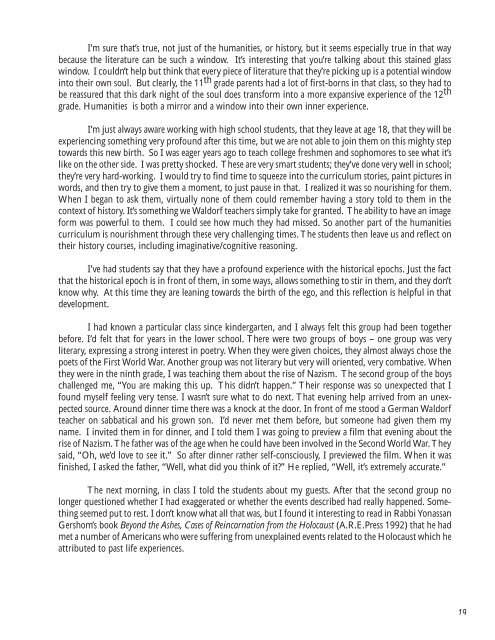Proceedings Colloquium on World History - Waldorf Research Institute
Proceedings Colloquium on World History - Waldorf Research Institute
Proceedings Colloquium on World History - Waldorf Research Institute
You also want an ePaper? Increase the reach of your titles
YUMPU automatically turns print PDFs into web optimized ePapers that Google loves.
I’m sure that’s true, not just of the humanities, or history, but it seems especially true in that way<br />
because the literature can be such a window. It’s interesting that you’re talking about this stained glass<br />
window. I couldn’t help but think that every piece of literature that they’re picking up is a potential window<br />
into their own soul. But clearly, the 11 th grade parents had a lot of first-borns in that class, so they had to<br />
be reassured that this dark night of the soul does transform into a more expansive experience of the 12 th<br />
grade. Humanities is both a mirror and a window into their own inner experience.<br />
I’m just always aware working with high school students, that they leave at age 18, that they will be<br />
experiencing something very profound after this time, but we are not able to join them <strong>on</strong> this mighty step<br />
towards this new birth. So I was eager years ago to teach college freshmen and sophomores to see what it’s<br />
like <strong>on</strong> the other side. I was pretty shocked. These are very smart students; they’ve d<strong>on</strong>e very well in school;<br />
they’re very hard-working. I would try to find time to squeeze into the curriculum stories, paint pictures in<br />
words, and then try to give them a moment, to just pause in that. I realized it was so nourishing for them.<br />
When I began to ask them, virtually n<strong>on</strong>e of them could remember having a story told to them in the<br />
c<strong>on</strong>text of history. It’s something we <strong>Waldorf</strong> teachers simply take for granted. The ability to have an image<br />
form was powerful to them. I could see how much they had missed. So another part of the humanities<br />
curriculum is nourishment through these very challenging times. The students then leave us and reflect <strong>on</strong><br />
their history courses, including imaginative/cognitive reas<strong>on</strong>ing.<br />
I’ve had students say that they have a profound experience with the historical epochs. Just the fact<br />
that the historical epoch is in fr<strong>on</strong>t of them, in some ways, allows something to stir in them, and they d<strong>on</strong>’t<br />
know why. At this time they are leaning towards the birth of the ego, and this reflecti<strong>on</strong> is helpful in that<br />
development.<br />
I had known a particular class since kindergarten, and I always felt this group had been together<br />
before. I’d felt that for years in the lower school. There were two groups of boys – <strong>on</strong>e group was very<br />
literary, expressing a str<strong>on</strong>g interest in poetry. When they were given choices, they almost always chose the<br />
poets of the First <strong>World</strong> War. Another group was not literary but very will oriented, very combative. When<br />
they were in the ninth grade, I was teaching them about the rise of Nazism. The sec<strong>on</strong>d group of the boys<br />
challenged me, “You are making this up. This didn’t happen.” Their resp<strong>on</strong>se was so unexpected that I<br />
found myself feeling very tense. I wasn’t sure what to do next. That evening help arrived from an unexpected<br />
source. Around dinner time there was a knock at the door. In fr<strong>on</strong>t of me stood a German <strong>Waldorf</strong><br />
teacher <strong>on</strong> sabbatical and his grown s<strong>on</strong>. I’d never met them before, but some<strong>on</strong>e had given them my<br />
name. I invited them in for dinner, and I told them I was going to preview a film that evening about the<br />
rise of Nazism. The father was of the age when he could have been involved in the Sec<strong>on</strong>d <strong>World</strong> War. They<br />
said, “Oh, we’d love to see it.” So after dinner rather self-c<strong>on</strong>sciously, I previewed the film. When it was<br />
finished, I asked the father, “Well, what did you think of it?” He replied, “Well, it’s extremely accurate.”<br />
The next morning, in class I told the students about my guests. After that the sec<strong>on</strong>d group no<br />
l<strong>on</strong>ger questi<strong>on</strong>ed whether I had exaggerated or whether the events described had really happened. Something<br />
seemed put to rest. I d<strong>on</strong>’t know what all that was, but I found it interesting to read in Rabbi Y<strong>on</strong>assan<br />
Gershom’s book Bey<strong>on</strong>d the Ashes, Cases of Reincarnati<strong>on</strong> from the Holocaust (A.R.E.Press 1992) that he had<br />
met a number of Americans who were suffering from unexplained events related to the Holocaust which he<br />
attributed to past life experiences.<br />
19
















